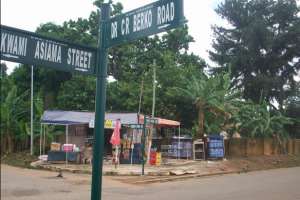
Ghana has made tremendous strides in its quest to achieve socio-economic development, especially in the real estate sector. Despite the relatively slow growth chalked in 2013, there seems to be some light in the tunnel with respect to the real estate sector. This has been given a boost with President John Mahama's call on Metropolitan, Municipal and District Assemblies (MMDAs) to embark on a street naming exercise across the length and breadth of the country. Online property portal, Lamudi, highlights six benefits the country and the real estate sector stand to gain:
1. Easier access to credit
The bane of most businesses and house-hunters, credit access could be given a huge boost just from this exercise. The Street-naming and house-numbering exercise will enable homes to be specifically identified within a community. Currently, the majority of Ghanaians use landmarks and descriptors within their areas, such as a kiosk, tree, office building, shop, plantain seller, etc. to provide directions to their home instead of specifying an address with a street name and house number. Borrowers seeking loans from banks have to draw out a directional map to their home, as an effective address system is non-existent. This creates ambiguity and errors leading to challenges in tracing borrowers' homes. An effective address system will ensure that each borrower can be correctly identified by their place of residence, thereby reducing the risk of not being able to locate a borrower who defaults on a loan. This would reduce the overall risk profile of borrowers and increase lender's willingness to extend credit.
2. Area development
A proper address system will enable government and state agencies responsible for the development and maintenance of infrastructure to better plan their activities. The prevailing conditions make it a bit difficult for such activities to be executed. An address system will provide MMDAs with data on their various districts, thus, better informing their decisions on the infrastructure required for the respective districts. This could lead to better road networks, thereby reducing traffic and improving the state of Ghana's roads and well-structured neighborhoods. A well-structured neighborhood would pave the way for utility companies to better execute their line of business, thus improving on their expansion of services to new homes.
3. Faster response to emergencies
In cases of emergencies, many areas in Ghana are hard to locate by the security and state machinery such as the police, ambulance and fire service. The absence of street names forces such institutions to rely on landmarks and this often delays response. Upon completion of Ghana's street naming exercise, the response rate is expected to improve and give residents and commercial tenants an added sense of security.
4. Courier services
The prevalent circumstance calls on most courier services to target a popular location and request the recipient to guide him or her to the home. An addressing system will not only improve the services of these companies, but also have a potential of cutting down travel costs, which could be passed onto the customer.
5. Boost to market intelligence
The presence of street names makes it easier for prospective businesses, especially in the real estate sector, to improve upon their market analyses. It provides the grounds for demographic data, improving the services of real estate developers and agents. For instance, a proper addressing system would inform a real estate developer on the number of people nearby and their economic profiles. This would lead to the construction of homes targeted at such individuals, thereby leading to customer satisfaction and business efficiency.
6. Improvement in revenue collection
A major challenge that sometimes restricts the activities of MMDAs is that funds. Ghana's Consolidated Fund is their major source of funding. They also fall on other sources such as property rates. Such an addressing system would enable MMDAs to collect appropriate rates, rather than the current trend of property undervaluation. Such revenue would be reinvested in the communities, meeting the needs of residents and businesses alike.




 Lay KPMG audit report on SML-GRA contract before Parliament – Isaac Adongo tells...
Lay KPMG audit report on SML-GRA contract before Parliament – Isaac Adongo tells...
 Supervisor remanded for stabbing businessman with broken bottle and screwdriver
Supervisor remanded for stabbing businessman with broken bottle and screwdriver
 NDC watching EC and NPP closely on Returning Officer recruitment — Omane Boamah
NDC watching EC and NPP closely on Returning Officer recruitment — Omane Boamah
 Your decision to contest for president again is pathetic – Annoh-Dompreh blasts ...
Your decision to contest for president again is pathetic – Annoh-Dompreh blasts ...
 Election 2024: Security agencies ready to keep peace and secure the country — IG...
Election 2024: Security agencies ready to keep peace and secure the country — IG...
 People no longer place value in public basic schools; new uniforms, painting wil...
People no longer place value in public basic schools; new uniforms, painting wil...
 'Comedian' Paul Adom Otchere needs help – Sulemana Braimah
'Comedian' Paul Adom Otchere needs help – Sulemana Braimah
 Ejisu by-election: Only 33% of voters can be swayed by inducement — Global InfoA...
Ejisu by-election: Only 33% of voters can be swayed by inducement — Global InfoA...
 Minority will expose the beneficial owners of SML, recover funds paid to company...
Minority will expose the beneficial owners of SML, recover funds paid to company...
 Prof. Opoku-Agyemang has ‘decapitated’ the NPP’s strategies; don’t take them ser...
Prof. Opoku-Agyemang has ‘decapitated’ the NPP’s strategies; don’t take them ser...
